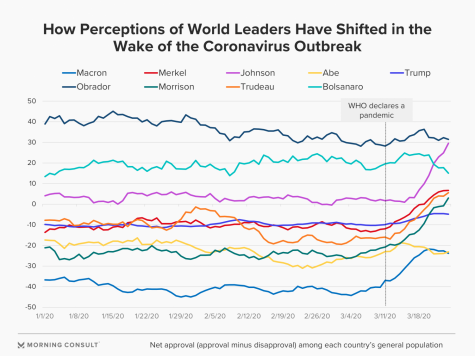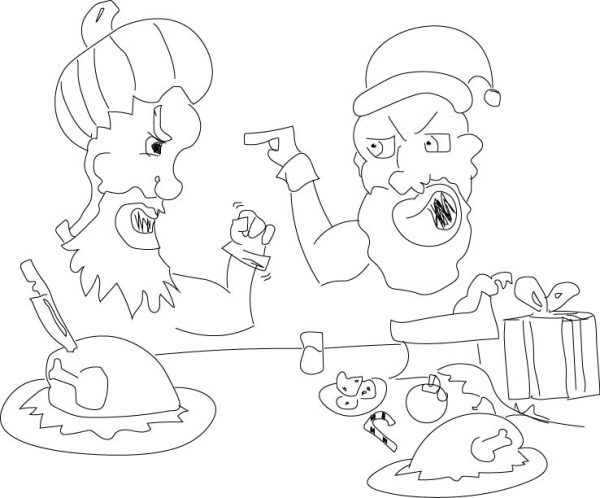OPINION: Why COVID-19 may be making world leaders more popular, for now
As March of 2020 ends, it is more or less apparent that the world is in a state of emergency. The COVID-19 (or coronavirus) pandemic has killed more than 30,000 individuals, and many metrics indicate that a severe economic downturn is on the horizon. The Dow Jones Industrial Average, the go-to index for the health of the stock market, has fallen from nearly 29,000 points to around 20,000. California and many other states are asking that restaurants and non-essential businesses shut down.
Our already loose monetary institutions will now have to deal with further rate cuts and the largest stimulus bill in American history. In fact, the current situation has gotten so bad that a sizable number of economists aren’t merely saying that a recession is at hand, but that we are already in a state of recession. James Bullard, economist and CEO of the Federal Reserve Bank of St. Louis, says that the unemployment rate could reach as high as 30% as a result of this crisis. To put things into perspective, during the financial crisis of 2007-08 the unemployment rate peaked at around 10%. Whether or not the crisis gets as severe as Bullard says, our leaders will be scrutinized for their performances. And in a crisis of this magnitude and a recession possibly imminent, you could be forgiven for thinking that the approval of our world leaders may suffer under these bad conditions. After all, U.S. President Donald Trump is receiving harsh criticism from both opposition Democrats and national media over his handling of the pandemic.
The reality is a little stranger and is not limited to the United States. Across the world, approval polls on average show world leaders on average showing increased support, often dramatically increased support.

Polling averages of President Trump’s job approval have shown him making modest gains. Since the onset of the crisis, his net approval ratings have increased by roughly four to seven percentage points. With Trump’s persistently low approval ratings being an ever-present thorn in his administration’s side, there is no doubt that some of the President’s supporters will use this data as evidence of increasing support for the President. And some will likely use this data as evidence of Trump’s reelection chances increasing.
However, these predictions may end up being too optimistic for the President. While Trump has seen mild gains in his approval, his increase is dwarfed by other world leaders. Leaders of European countries that have been hit especially hard by the coronavirus have shown massive gains in approval. U.K. Prime Minister Boris Johnson, who has himself contracted the coronavirus, has seen his approval soar nearly 30 points, while most of continental Europe’s leaders have seen at least double digit gains. Donald Trump in this particular poll has increased about five points. Leaders of Latin American countries that didn’t seem to be suffering as much from the pandemic recorded negligible increases. Keep in mind that polling for the above data was finished on March 24, but with no major changes to the state of the pandemic, the above trends will likely remain in place.
Now, one may wonder as to why leaders are seeing approval increases amidst one of the most cataclysmic events of a generation. The reason behind this has a name: it’s called the “rally ‘round the flag effect”. In short, this effect occurs when a crisis emerges that isn’t the fault of a country’s government, and the populace of the country rallies behind their leaders with increased loyalty and patriotism during said crisis. Pandemics are certainly not the only crisis in which this effect can begin to occur; natural disasters, terrorist attacks, and wars can also cause the rally ‘round the flag effect. Politicians should not get too excited though: the gain in approval can be and usually has been temporary.
One of the most prominent examples of the rally effect in recent memory is the 9/11 aftermath. With the deadliest terrorist attack ever on U.S. soil having taken place, President George W. Bush saw a massive surge in his approval ratings—they rose from 55% to 90% approval. However, a little over a year later his approval had decreased to its pre-9/11 state. And this makes sense; voters can give more loyalty to their leaders in response to a large crisis, but crises aren’t forever. Almost always voters will fall back into their pre-crisis attitudes once the crisis becomes irrelevant. If the crisis reigns too long, then a leader may not just be reduced to pre-crisis approval; he or she may be at his or her most unpopular point yet.
The United States is on track to witness a competitive presidential election this November. A question on many people’s minds is probably, “Are Trump’s reelection chances increasing?” The answer, whether you like it or not, is probably not. Donald Trump’s job approval has increased slightly, but with almost seven months until the 2020 election, it is unlikely that these increases will amount to something substantial. In fact, even right now, general election polls pitting Trump against presumptive Democratic candidate Joe Biden has shown virtually no change in the state of the race.
Very little of what was just outlined was unexpected; this “rally ‘round the flag effect” is a common feature for a nation in crisis. One of the key things to remember about the rally effect is that in the same way crises are not permanent, these approval changes are rarely permanent either. They can change on a whim and often change dramatically. But more likely than not, the approval of our world leaders will end up settling down where it was before the crisis. Reality doesn’t like to be climactic in this way.






